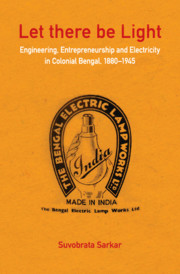Book contents
- Frontmatter
- Contents
- List of Figures
- Preface
- Acknowledgements
- List of Abbreviations
- Introduction
- 1 Technical Knowledge and Its Institutes
- 2 Entrepreneurship, Industry and Technology
- 3 Electrification: The Shaping of a Technology
- 4 Domesticating Electricity
- 5 Assimilation of Technological Ideas
- Conclusion
- Bibliography
- Index
4 - Domesticating Electricity
Published online by Cambridge University Press: 30 April 2020
- Frontmatter
- Contents
- List of Figures
- Preface
- Acknowledgements
- List of Abbreviations
- Introduction
- 1 Technical Knowledge and Its Institutes
- 2 Entrepreneurship, Industry and Technology
- 3 Electrification: The Shaping of a Technology
- 4 Domesticating Electricity
- 5 Assimilation of Technological Ideas
- Conclusion
- Bibliography
- Index
Summary
When electricity first came to Calcutta, it was a fearful object to most of the rich and affluent of the city. They assumed that for new electric connection they had to make a hole in the wall and that could be risky. Thus, tried hard to avoid such things! My father was the first who discarded such phobia by applying for electricity and subsequently got the connection in our locality. The incident acted as a catalyst and after that many applied for electric connection. As that was like big advertisement for them, a pleased electric supply company relieved my father from remitting the connection changes.
—Purnima Debi on her father, Gaganendranath Thakur (1900?)Realizing the need of a journal on electricity in vernacular, we started Bijoli few months back. We earnestly hope that our initiative would be recognized by the Bengali entrepreneurs who involve in the business of electricity and things electrical in and outside Bengal. We also hope that the journal would be helpful to them. We want to see our fellow Bengalis to excel in electricity industry and our journal would be the mouthpiece of such emerging entrepreneurial activities.
—Bijoli, in an editorial published in 1933The introduction of electricity transformed life fundamentally. At first, a luxury good, electric light and power generation, both symbols of modernity, soon became a basic need everywhere in the world. The subject of electrification has fascinated business and economic historians along with scholars with an interest in technology: analysing strategies of manufacturing companies from different perspectives, the interaction between social and cultural factors and the process of electrification, the history of electrical technology, and many more aspects. But the literature mostly caters to the Global North. Alongside capital, land, and labour, energy – especially electricity – is the key input for contemporary capital accumulation. Poor quality power supply damages the industrial and commercial interests of the state and thus casts doubt on the extent of the state's ‘pro-business tilt’. Elizabeth Chatterjee rightly opines that the power sector provides a crucial lens on Indian political economy.
The harnessing of electricity has been considered one of the driving technologies behind modern capitalism and industrialization.
- Type
- Chapter
- Information
- Let there be LightEngineering, Entrepreneurship and Electricity in Colonial Bengal, 1880–1945, pp. 153 - 189Publisher: Cambridge University PressPrint publication year: 2020



